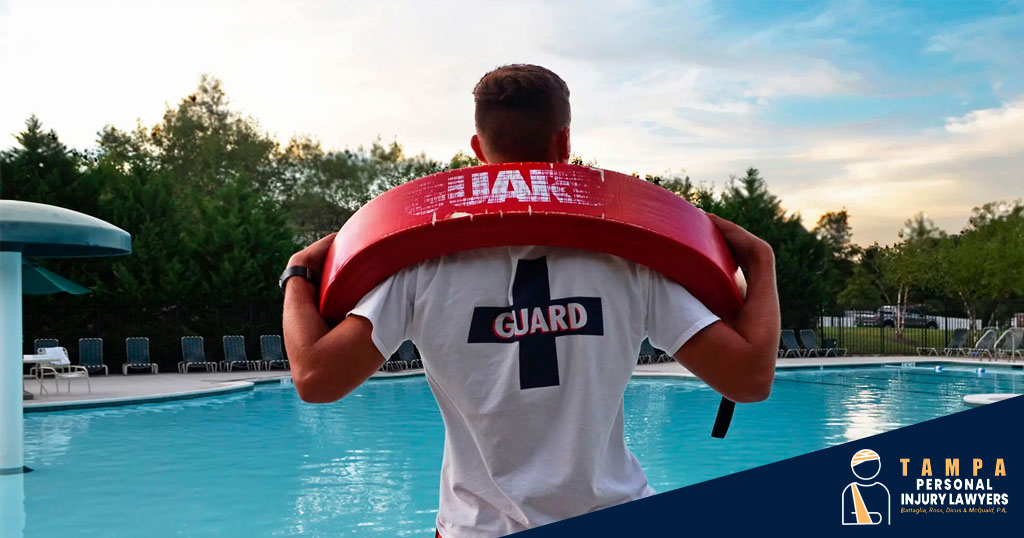A pool is often one of the most enticing amenities for hotels and motels, but they don’t always have lifeguards on duty. In Tampa, private pools are not legally required to provide professional lifeguard staff. This results in countless drowning accidents in Tampa every year. From near death injuries to drowning fatalities, the results are usually catastrophic or deadly. The saddest reality of drowning accidents is that innocent children are often the most vulnerable to get injured or die in an accident.
One question that often arises after a pool accident is whether or not the pool owner should have had a lifeguard on duty. While Tampa business owners do have a legal obligation to uphold a duty of care to their customers, providing a lifeguard is not one of those duties. In this article we’ll go over Florida’s laws regarding lifeguards and some relevant legal precedence.
Table of Contents
ToggleHashmat v. Loews: Legal Precedent Regarding Pool Laws in Florida
In December of 2013, Kamal Hashmat drowned in a Miami Hotel swimming pool. He apparently struggled in the water before becoming fully submerged and dying from drowning. His wife, Iman Kamal-Hashmat filed a wrongful death lawsuit against the hotel, Loews, as the personal representative of Mr. Hasmat’s estate. In the case of Hashmat v. Loews Miami Beach Hotel, 3rd District Court of Appeal Case No. 3D18-1514, the courts decided that Loews was not negligent and did not have a legal obligation to provide a lifeguard in their private (hotel) pool.
The estate made several claims in the wrongful death action against Loews hotel:
- First, they claimed that Loews was negligent in its duty of care to Mr. Hashmat and other guests to provide, operate, control, and manage a reasonably safe pool and protect guests from unreasonable physical harm. As a result of their negligence, Mr. Hashmat drowned and died.
- The plaintiff further claimed that the hotel had an additional duty to train and supervise staff members of the hotel for safe operation and maintenance of the pool
- And that the hotel should have warned pool users that there was no lifeguard on duty
In the hearing, three questions were presented to the jury:
- Was Loews negligent for failing to maintain the pool in a reasonably safe condition? Or did they fail to correct a dangerous condition that caused Mr. Hashmat’s death?
- Was Loews negligent in training and supervision of employees and legally causing Mr. Hashmats death?
- Did Loews fail to take reasonable care in reacting to Mr. Hashmat’s drowning when they performed CPR, or did that cause him further harm or injury?
The jury decided in favor of Loews hotel and found them not guilty on all three questions. However, the estate appealed the court’s decision with a new claim that the hotel failed to provide a lifeguard on duty when it should have provided one.
The Court’s Decision: Lifeguards Are Not Required at Private Pools
The Third District Court of Appeal reviewed the court’s decision and agreed that under Tampa law, Loews Hotel did not have a legal duty to provide a lifeguard. They also ruled that Mr. Hashmat swam in the pool willingly, despite open, obvious and known risks (a pool with no lifeguard is inherently dangerous).
The estate presented the fact that Tampa laws (Florida Administrative Code, Rule 64E-9.008, Chapter 514 of the Florida Statutes and Florida Statute 381.006(13) specify the use of lifeguards. However, the court clarified that they are only required in areas of general access (e.g., public pools and amusement parks), not in areas of limited access (hotels and stores). Despite the fact that the plaintiff used several previous cases to support their claim, the court still found that the hotel had no legal duty to provide a lifeguard or was negligent in any way.
Another clarification that came about from this case is that even if a lifeguard is on duty, they can’t be blamed for someone who drowns in the pool if they are there voluntarily. As in the case of Pickett v. City of Jacksonville, 20 So.2d 484 (Fla. 1945), two lifeguards were present at a public pool when someone drowned. The lifeguards were not found liable for the drowning death because they were there voluntarily, rather than being legally required to be there. The ruling on the Pickett case reiterated that Florida law only requires professional lifeguards on duty to meet certain requirements, but does not necessarily require hotels to provide lifeguards. The court ultimately upheld the deciision on favor of Loews Hotel.
Private Pools Don’t Have the Same Rules as Public Pools – Lifeguards Are Not Required at Private Pools
Under Florida Administrative code, all Tampa lifeguards must follow certification requirements when they work at public swimming pools. While this code mandates certification requirements for lifeguards, it doesn’t actually require private businesses to hire lifeguards.
However, private businesses, such as hotels and motels, do owe their guests a duty of care to protect them from any foreseeable dangers. This can become tricky when it comes to a swimming pool, which poses inherent dangers. Anyone who gets in a pool could potentially suffer a medical emergency or drown, or even die. However, Tampa courts have consistently ruled that these are open and obvious dangers for which patrons should take self-precautions before deciding to swim. Furthermore, hotels and motels are not obligated to provide lifeguards as part of the “duty of care” owed to patrons. Due to these laws, it’s often difficult to recover compensation after a swimming pool accident that occured in a private pool.
Hotels Can Are Liable for Some Hazards – It Depends on the Circumstances
Even if a business or hotel was not legally required to provide a lifeguard, they could still be liable for an accident under certain circumstances. For instance, if the pool was somehow defective and caused someone’s injuries, the owner or business could be found liable. If the pool had a defective diving board that caused someone to sustain injuries or loose tiles that caused them to slip, those are hazards the business should have taken measures to correct before someone got injured.
In addition, if a hotel sees a person engaging in dangerous activity, they are legally responsible for prohibiting that person from entering the pool. The business must also take precautionary steps to protect the guest from any crime by locking the pool gates or doors.
When it comes down to liability, hotels are expected to keep their pools in safe conditions for patrons to use, without any hazards present. However, they don’t legally need to have lifeguards on duty. Determining liability in the event of an accident will require assessing the nature of the hazard, whether or not the hotel knew about it, and how long the hazard was there. If a hotel knew about a hazard for some time and did not take the necessary measures to fix it, they could be found liable.
Drowning Statics in Tampa, Florida
Florida has the most swimming pools of all the states in the country (along with California). As of 2023, the current pool count in Florida is 1.59 million. Here are some additional statics on pools drowning accidents in Florida:
- Florida is the leading state for unintentional drowning deaths in children aged 1 to 4
- Similar size states like Texas and California have less pool fatalities than Florida
- May is national water safety month as well as drowning prevention month
- Experts recommend teaching kids water safety as early as possible because accidental drowning is the leading cause of death in young children in Hillsborough County
- In 2021, 486 people suffered drowning deaths in Florida
- Half of those deaths were children, and 156 of those deaths were children under the age of 5
- Studies show that learning how to swim at an early age decrease the risk of drowning by 80%
- More parents are starting to give their young children swimming lessons to prevent drowning accidents. For example, Watermelon Swim in Tampa says they are seeing infants as young as 6 months come in for swim lessons and they encourage parents to get their kids acclimated with water safety as soon as possible.
- Drowning accidents don’t just happen in pools; they can also happen in bathtubs.
What if My Child or Loved One Suffered Injuries or Drowned in a Public Pool?
If your loved one or child suffered a drowning death in a public pool with no lifeguard on duty, we may be able to help you. If any of the following hold true, you may have grounds for a wrongful death or personal injury claim:
- The owner failed to provide adequate safety equipment
- The owner failed to take necessary measures to ensure a safe swimming environment
- The owner failed to post warning signs of dangerous conditions
- The staff were not trained properly or lacked sufficient training
You must also be able to prove the following points for the property or pool owner to be liable for the accident:
- They owed you a legal duty
- They should have known about a dangerous condition
- They had the chance to repair or remedy the dangerous condition but knowingly failed to do so
- Their negligence or failure to take appropriate action was the direct cause of the pool
Contact a Tampa Drowning Accident Attorney Today
We are experienced Tampa drowning accident attorneys who can help you. We know that this is the most devastating experience that no amount of many can make right. But, we can fight aggressively on your behalf to ensure you get fair compensation for you or your loved one’s injuries. Or, if your child or family member suffered a wrongful death by drowning, we can help you devise the best course of action for your case. You may be entitled to damages such as medical bills, lost wages, lost future earnings, pain and suffering, diminished quality of life, loss of companionship, loss of support and consortium, and more.
Call us today to discuss your case details and find out how we can help you. Your initial consultation is free.






























